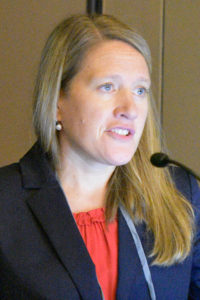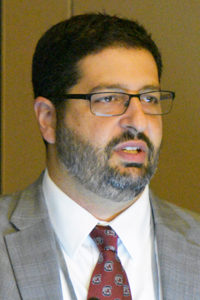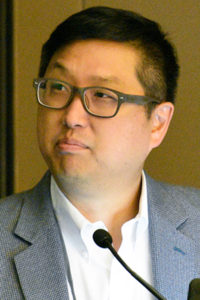
The move to competency-based assessment for certification has changed the face of medical education. Mastery-based education, a concept that focuses on learning specific skills using deliberate, focused practice and feedback, as well as simulation, has emerged as an effective model for medical education at all levels.
“Where we used to use the eyeball test to determine your level of competence, we now use formal assessment tools and frequent feedback to help all of our learners master the skills they need to know as practicing physicians,” said Darlene Nelson, MD, FCCP, of Mayo Clinic.
Dr. Nelson opened a Sunday session on instructional strategies for teaching bedside procedures by outlining mastery-based learning.
Assessment and feedback are key to mastery-based learning, she said, so is individualized instruction.
Teaching all-comers in the same way—the traditional lecture format—yields a tremendous variation in outcomes. Adapting teaching to the learner, combined with intensive practice, coaching, and feedback, provides a much more uniform level of learning and improves clinical outcomes.

Multiple studies have shown that mastery-based learning of bedside procedures for residents and fellows produces fewer patient complications, shorter lengths of stay, and lower costs compared to more traditional teaching techniques, she noted.
“For procedural skills, mastery-based learning aligns very well with competency-based assessment that we undergo as part of our certification and continuing education,” Dr. Nelson said.
Simulation is an important part of mastery-based learning, especially learning skills such as intubation or central line placement where patient harm is a real possibility.
“Failure is good in a simulation,” said Nicholas Pastis, MD, FCCP, of the Medical University of South Carolina. “Failure is how you learn, but you don’t want to fail a patient. That’s why simulation can be such an important part of learning basic skills.”
Deliberate training and intensive coaching are the heart of mastery-based learning, noted Hans Lee, MD, FCCP, of Johns Hopkins University. Mastering a skill requires about 10,000 hours, roughly 10 years. But mastering a skill is not a matter of time spent or numbers of procedures performed. Mastering a skill means focused, intensive practice with frequent feedback and correction, usually from an outside coach.

“Baseball great Joe DiMaggio always got angry when reporters talked about him as a natural hitter,” Dr. Lee said. “He always said there was nothing natural about his hitting skills. They were the result of endless hours of practice swings with live pitchers and in his basement.”
Mastering procedural skills is no different, he said.
“It is not the number of hours you practice, it is the hours of deliberate practice,” Dr. Lee said. “Deliberate practice focuses on the coaching aspect.”
Deliberate practice is a feedback loop of learning a skill, practicing, getting feedback, and repeating. Deliberate practice is built into medical education, but the need for training and practice does not end with the last day of fellowship.
“In training, you have a steep learning curve, but you have coaching,” he said. “When you get into practice, you lose the coaching. The easy thing is to plateau and stop improving. You need to continue the deliberate practice to continue learning and becoming an expert.”





